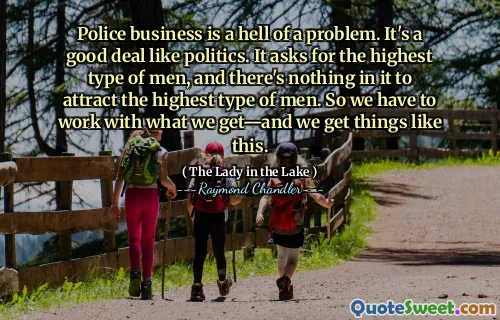
Police business is a hell of a problem. It's a good deal like politics. It asks for the highest type of men, and there's nothing in it to attract the highest type of men. So we have to work with what we get—and we get things like this.
This quote sheds light on the challenging realities faced by those in law enforcement, highlighting the paradox between the ideal qualities expected of police officers and the often unglamorous or less desirable realities of the job. It recognizes that policing demands individuals of the highest integrity, intelligence, and moral strength—traits that are typically rarer and harder to come by. Yet, the profession finds itself struggling to attract such caliber of personnel, largely because of the nature of the work, societal perceptions, and perhaps the inherent risks involved.
The comparison to politics is particularly telling; both professions require a high moral character, deep commitment, and a sense of duty. However, they also both tend to be scrutinized, politicized, and sometimes marred by corruption or failure, further deterring the best candidates. This creates a cycle where the work often falls into the hands of those less suited, yet the professionals who excel may be discouraged due to lack of resources, recognition, or the burdens imposed by the profession.
Understanding these dynamics is crucial for appreciating the complexities faced by police forces. It also emphasizes the importance of ongoing efforts to recruit, train, and retain individuals of the highest integrity and capability. Additionally, it speaks to the societal need to elevate respect and support for such roles, fostering an environment that encourages the best talent to serve and protect.
In essence, Chandler’s remark is a sober reflection on the struggles inherent in maintaining high standards within the policing system, acknowledging both the noble ideals and the gritty reality of the work.






